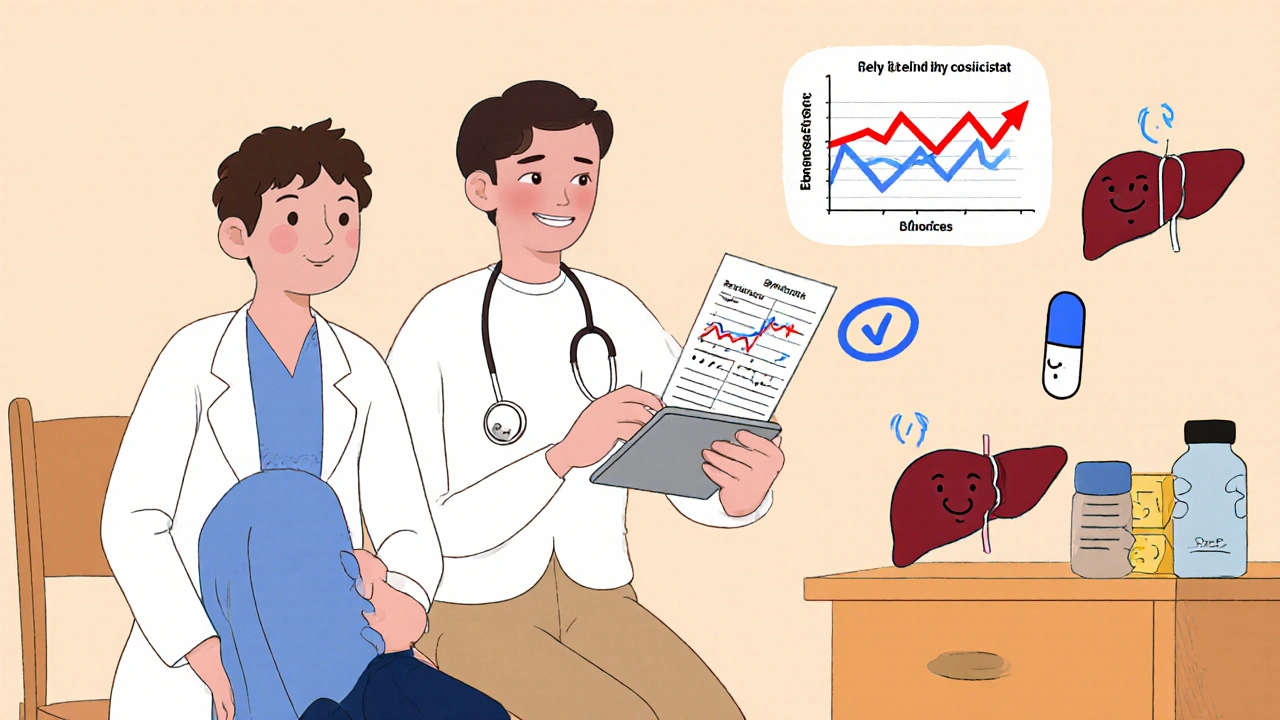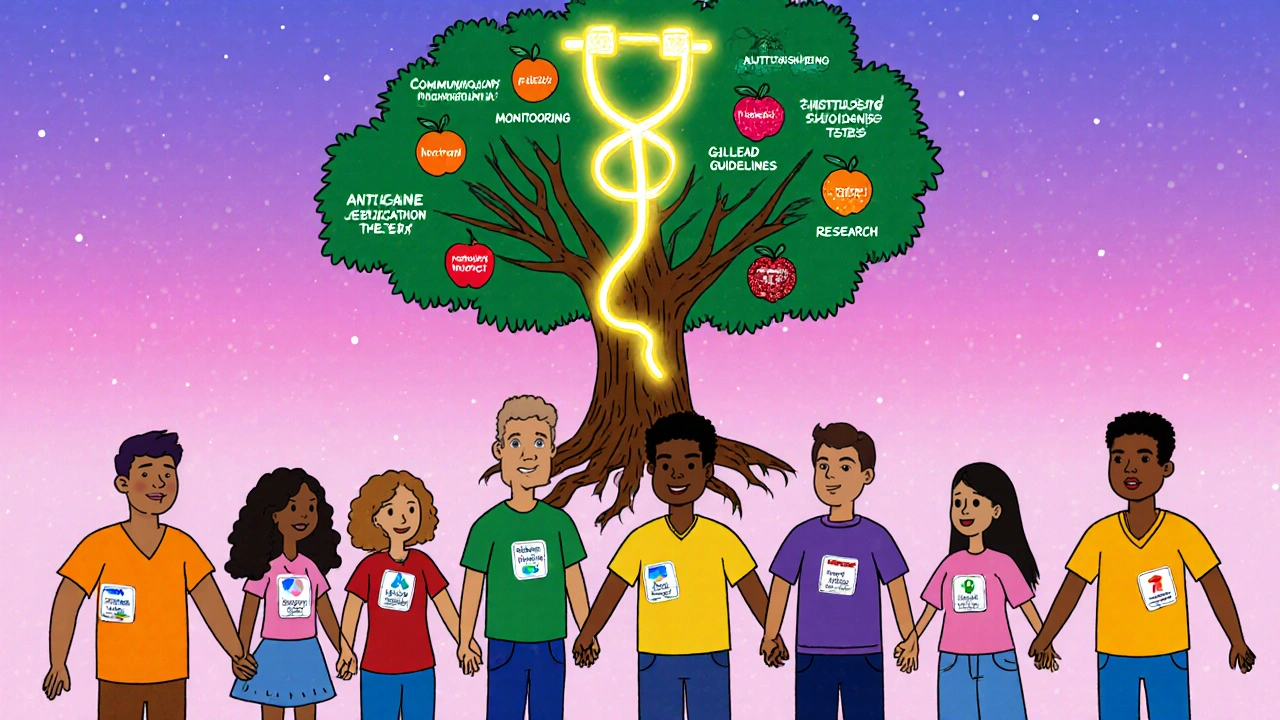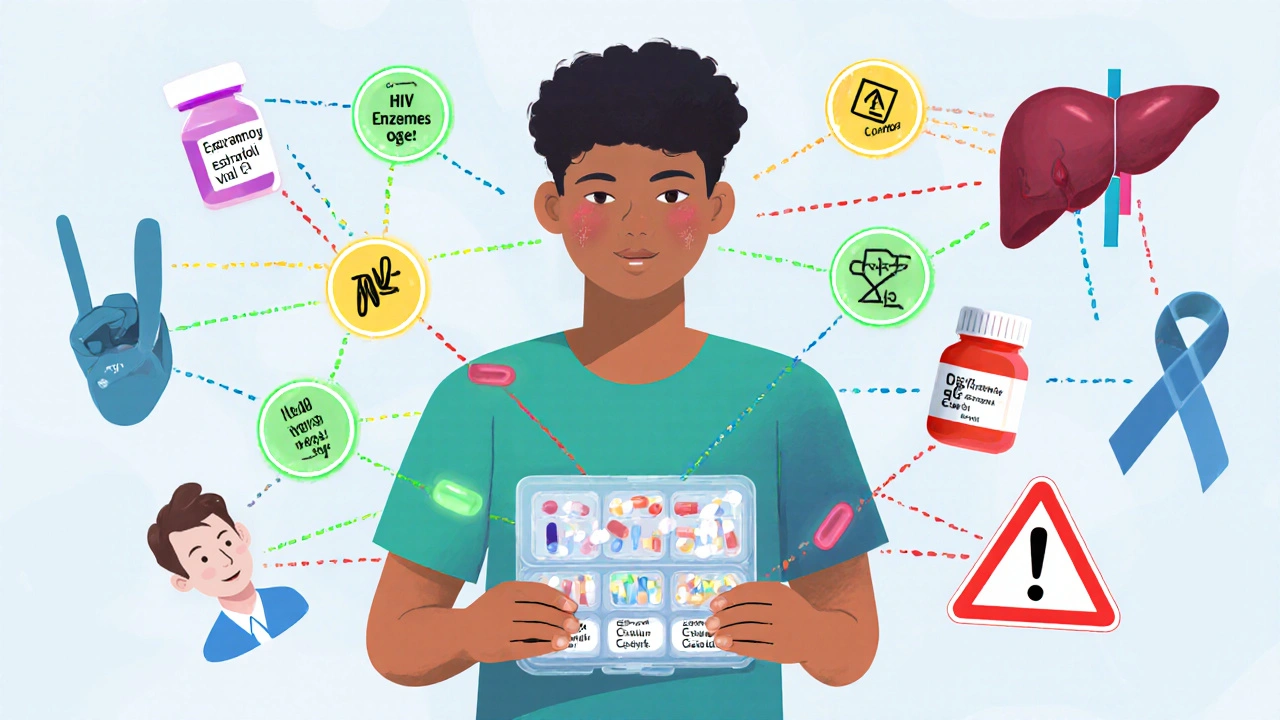When someone starts gender-affirming hormone therapy (GAHT), they’re not just changing their body-they’re starting a long-term medical journey. And like any medication regimen, it doesn’t happen in a vacuum. Many people on GAHT are also taking other drugs: antidepressants, HIV meds, blood pressure pills, even over-the-counter supplements. The real question isn’t whether these medications interact-it’s how they interact, and what that means for your safety and effectiveness.
How Hormones Are Processed in the Body
Understanding interactions starts with knowing how your body handles hormones. Feminizing therapy usually involves estradiol (either as pills, patches, or gels) and anti-androgens like spironolactone or cyproterone acetate. Masculinizing therapy uses testosterone, delivered as gels, injections, or pellets. These hormones don’t float around freely-they’re broken down by specific liver enzymes, mainly CYP3A4 and CYP2D6.
That’s where problems can pop up. If you’re taking a drug that speeds up or slows down those enzymes, your hormone levels can swing too high or too low. For example, some HIV medications strongly affect CYP3A4. If you’re on estradiol and start a drug like cobicistat (often found in HIV combo pills), your estradiol levels could jump by 40-60%. That might mean more side effects-headaches, mood swings, or even blood clots. On the flip side, efavirenz, another HIV drug, can slash estradiol levels by half, making your hormone therapy less effective.
HIV Medications and GAHT: What the Data Shows
Transgender people are at higher risk for HIV, so many are on antiretroviral therapy (ART). The good news? Most HIV drugs can be safely combined with GAHT-but not all. A 2024 review of 27 studies involving over 1,800 transgender patients found clear patterns.
- Boosted protease inhibitors (like darunavir/cobicistat): These raise estradiol levels significantly. If you’re on these, your doctor should check your hormone levels after 2-4 weeks and may lower your estradiol dose.
- NNRTIs (like efavirenz or nevirapine): These lower estradiol. You might need a higher hormone dose to stay on track with your goals.
- INSTIs (like dolutegravir or bictegravir): These are the safest bets. They don’t interfere much with hormones and are now the first-line choice for many people on GAHT.
For testosterone users, HIV meds rarely cause issues. Testosterone doesn’t rely heavily on the same liver pathways, so interactions are minimal. That’s one less thing to worry about for trans men.
PrEP and GAHT: No Need to Choose
If you’re taking PrEP to prevent HIV, you might be afraid it’ll mess with your hormones. A 2022 study of 172 transgender people on tenofovir/emtricitabine (Truvada or Descovy) found no clinically meaningful changes in hormone levels. Estradiol and testosterone stayed stable, and the PrEP drug levels didn’t drop either. That means you can take PrEP and GAHT together without adjusting either.
Even better, researchers found that using dried blood spot tests to check PrEP levels (a simple finger prick) helped ensure people were taking their meds consistently-without needing to change hormone doses. This is especially important because PrEP works best when taken daily.

Psychiatric Medications: The Gray Area
This is where things get tricky. Many transgender people take antidepressants, mood stabilizers, or antipsychotics. But here’s the problem: most clinical trials for these drugs never included transgender participants. Only 3% of antidepressant studies from 2021 included trans people, according to a JAMA Internal Medicine analysis.
Still, we know some patterns. SSRIs like fluoxetine (Prozac) and sertraline (Zoloft) can slow down CYP2D6, which may raise estradiol levels slightly. Not a huge deal for most, but if you’re already on high-dose estradiol, it could add up.
Carbamazepine (Tegretol), used for seizures or bipolar disorder, is a strong CYP3A4 inducer. It can lower estradiol and testosterone levels, making GAHT less effective. One study found that 17 out of 12,000 trans people on testosterone needed to increase their antidepressant dose by 25-50% within six weeks after starting hormones-likely because testosterone changed how their brain processed serotonin.
Bottom line: Don’t stop your psychiatric meds. But do tell your doctor you’re on GAHT. Monitor your mood, sleep, and energy. If you feel off after starting hormones, it might not be your gender identity-it might be a drug interaction.
Other Common Medications to Watch For
It’s not just HIV and mental health drugs. Many everyday medications can interfere:
- Antibiotics: Rifampin (used for tuberculosis) is a strong enzyme inducer. It can drop hormone levels fast. Avoid it if possible, or plan for a dose adjustment.
- Seizure meds: Phenytoin and phenobarbital also speed up hormone breakdown. Ask your neurologist if there’s a safer alternative.
- St. John’s Wort: This herbal supplement is a hidden danger. It’s sold as “natural,” but it’s a powerful CYP3A4 inducer. One case report showed a trans woman’s estradiol levels dropped by 70% after starting it.
- Birth control pills: If you’re taking them for acne or cycle regulation, remember-estradiol in birth control is synthetic and works the same way. Don’t double up with GAHT unless your provider says so.

What You Should Do Right Now
You don’t need to panic. Most interactions are manageable. Here’s what to do:
- List every medication-prescription, OTC, supplements, and herbal products. Include doses and how often you take them.
- Bring it to your endocrinologist or primary care provider who knows GAHT. Don’t assume they’ll know about your HIV meds or antidepressants unless you tell them.
- Ask for hormone level checks after starting or changing any new drug. A simple blood test can catch a problem before you feel it.
- Use a pill organizer with clear labels. Mixing up meds is easy when you’re managing multiple conditions.
- Don’t stop or change doses on your own. Even if you think a drug isn’t working, talk to your provider first.
Where the Science Is Headed
Research is moving fast. The NIH-funded Tangerine Study, running through 2025, is tracking 300 trans adults on 12 common psychiatric drugs alongside GAHT. Early results will help doctors know exactly when to adjust doses.
Pharmaceutical companies are also waking up. Gilead Sciences now requires GAHT interaction studies for all new PrEP trials. That’s a big shift-from ignoring trans people in research to designing studies with them in mind.
But gaps remain. We still don’t know much about interactions with newer drugs like cabotegravir (long-acting injectable PrEP) or brexanolone (for postpartum depression). If you’re on one of these, your provider should monitor you extra closely.
Final Thought: You’re Not Alone
It’s easy to feel like you’re the only one juggling hormones, HIV meds, and antidepressants. You’re not. Thousands of people are doing the same thing-some with smooth sailing, others with bumps along the way. The key isn’t perfection. It’s communication. Keep your team informed. Ask questions. Track how you feel. And remember: your body deserves care that’s as thoughtful as your identity is valid.
Can I take birth control while on gender-affirming hormone therapy?
Yes, but only if your provider recommends it. Birth control pills contain synthetic estrogen, which can interfere with your prescribed estradiol dose. Taking both together may raise your estrogen levels too high, increasing clotting risk. If you’re on testosterone, birth control isn’t needed for pregnancy prevention, but some use it for acne or cycle control. Always consult your doctor before combining them.
Do herbal supplements like turmeric or ashwagandha interact with GAHT?
Most common herbal supplements don’t have strong evidence of interactions with GAHT. However, turmeric can mildly affect liver enzymes, and ashwagandha may influence cortisol and thyroid levels, which can indirectly affect hormone balance. St. John’s Wort is the big exception-it’s been shown to cut estradiol levels by up to 70%. Always disclose all supplements to your provider, even if they seem harmless.
What if my hormone levels drop after starting a new medication?
If you notice symptoms like fatigue, mood changes, or reduced transition progress after starting a new drug, ask for a blood test to check your hormone levels. If levels are low, your provider may increase your hormone dose. This is especially common with enzyme-inducing drugs like rifampin, carbamazepine, or efavirenz. Don’t wait for symptoms to worsen-early detection prevents setbacks.
Is testosterone safe with antidepressants?
Testosterone itself rarely interferes with antidepressants. But some people find that after starting testosterone, their mood or anxiety changes-not because the meds stopped working, but because their body chemistry shifted. In rare cases, people need to increase their antidepressant dose by 25-50% within 6 weeks of starting testosterone. If you feel your mental health is slipping, talk to your prescriber. It’s not weakness-it’s adaptation.
Should I stop my GAHT before surgery?
No, you generally shouldn’t stop GAHT before surgery. Stopping estrogen increases clotting risk, and stopping testosterone can cause emotional distress. Most surgeons now recommend continuing GAHT unless you’re having major pelvic or abdominal surgery with prolonged immobility. Always discuss your hormone plan with your surgical team and endocrinologist together. They’ll weigh your individual risks and benefits.


Kshitij Nim
October 29, 2025 AT 12:37Been on T for 3 years and on Truvada since day one. No issues. My endo checked my levels after 6 weeks and said everything looked stable. Just make sure you’re not skipping doses - consistency is everything.
Scott Horvath
October 29, 2025 AT 23:35so i just started estradiol and got prescribed doxycycline for acne and now i feel like a zombie
is this normal or did my body just betray me
Armando Rodriguez
October 30, 2025 AT 04:29This is an incredibly well-researched and clinically valuable breakdown. As a healthcare provider, I can’t stress enough how critical it is for patients to disclose all medications - including supplements - during hormone therapy consultations. Many interactions are preventable with open communication and timely lab monitoring.
jennifer sizemore
October 31, 2025 AT 11:03Thank you for writing this. I was terrified to tell my psychiatrist I was on GAHT because I thought they’d judge me. Turns out they were super cool and adjusted my sertraline dose after I mentioned I was on estradiol. You’re not alone. Talk to your docs.
matt tricarico
October 31, 2025 AT 16:34Interesting how the article casually assumes all trans people are medically compliant. In reality, most of us are just trying to survive on Medicaid with three different pharmacies refusing to fill our scripts. This is all very academic until you’re choosing between PrEP and your estradiol.
jerry woo
November 1, 2025 AT 10:23Let’s be real - the medical system is still treating trans folks like lab rats with a side of side effects. CYP3A4? CYP2D6? Sounds like a fucking alphabet soup designed by people who’ve never had to pay for their own hormones. And don’t get me started on St. John’s Wort - that shit’s a silent assassin. I lost 60% of my estradiol levels because some wellness blogger told me it "balances cortisol." Now I’m back on 4mg twice daily and still feel like I’m running on fumes.
Meanwhile, Big Pharma’s rolling in cash because they didn’t test their damn drugs on us until 2024. We’re not guinea pigs. We’re patients. And we deserve better than this.
Also - yes, I know you’re reading this, Matt Tricarico. You’re the reason this system is broken.
Jillian Fisher
November 1, 2025 AT 13:40Does anyone know if melatonin interacts with estradiol? I’ve been taking it for sleep but I’m worried it might mess with my levels.
Rachel Marco-Havens
November 1, 2025 AT 15:38If you’re taking supplements you’re just asking for trouble. You think turmeric is harmless? It’s not. You think ashwagandha is "natural"? That doesn’t mean safe. You’re not special. You’re not exempt from pharmacology. Stop self-medicating and go see a real doctor.
Kathryn Conant
November 1, 2025 AT 15:56YOU CAN DO THIS. I was on carbamazepine and estradiol for two years before I realized my levels were half of what they should’ve been. I cried. I screamed. I Googled until 3am. Then I found an endo who actually listened. Now I’m thriving. It’s not easy but you’re worth the fight. Keep pushing. Your body is not your enemy.
j jon
November 1, 2025 AT 19:00PrEP and GAHT? Totally fine. Been on both for 4 years. No issues.
Jules Tompkins
November 3, 2025 AT 02:32My cousin’s trans and she’s on dolutegravir + estradiol. Said she felt better than ever. No headaches. No mood swings. Just… normal. Like, finally normal. Wish more people knew this was possible.
Sabrina Bergas
November 4, 2025 AT 08:44Why are we even talking about this like it’s a mystery? The system is designed to keep trans people unstable. If your hormones interact with your meds, that’s not biology - that’s capitalism. They don’t want us to thrive. They want us dependent. And now they’re selling us "safe" INSTIs like they’re doing us a favor. Wake up.
Melvin Thoede
November 4, 2025 AT 17:56Just want to say I’m so proud of everyone here. You’re fighting for your life every single day and still showing up to learn, to share, to care. That’s strength. That’s resilience. 💪❤️
Suzanne Lucas
November 5, 2025 AT 16:47I started T and then got prescribed Adderall and suddenly I felt like a robot with anxiety. I cried for three days. My doctor said "maybe it’s the combo" and switched me to Vyvanse. Best decision ever. Now I’m flying. Literally. Like I can breathe again.
Ash Damle
November 5, 2025 AT 20:35Thanks for the info. I’ve been on GAHT for a year and just started rifampin for TB exposure. My endo said to double my T dose for now. Feels weird but I trust the science. Just wanted to say - this thread helped me feel less alone.